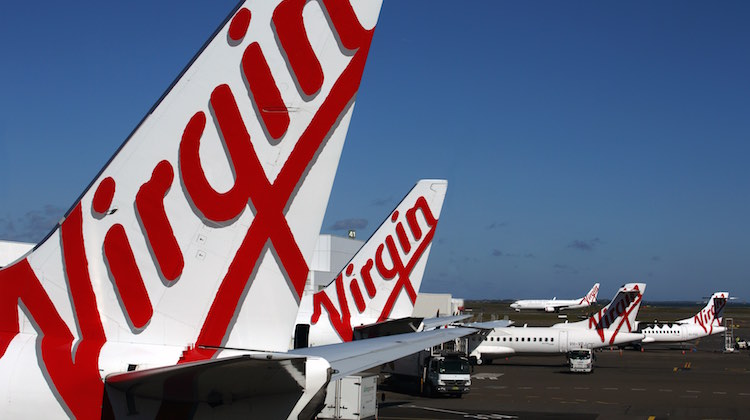
Virgin Australia has received an improved ratings outlook from S&P Global Ratings as the airline moves to pay down debt and reduce costs.
The ratings agency, formerly known as Standard and Poor’s, said on Monday it had reaffirmed Virgin Australia’s “B+” corporate credit rating while lifting the ratings outlook to stable, from negative previously.
“The stable outlook reflects our growing confidence that Virgin has a realistic deleveraging path as the airline turns to generating cash, supported by steady market conditions,” S&P Global Ratings said in a statement on Monday.
“Virgin Australia’s investment in repositioning itself as a full-service airline is substantially complete, and we believe its focus has now turned to cash generation.”
In May, the airline group reported a statutory net loss after tax of $69 million for the three months to March 31 2017, a deterioration from a loss of $58.8 million in the prior corresponding period.
The airline group was also in loss-making territory on an underlying basis, which removes one-off costs and was regarded as the best measure of financial performance, slumping to an underlying before tax loss of $62.3 million, from underlying profit before tax of $18.6 million a year ago.
Virgin’s May trading update noted the company had reduced its net debt by by 33 per cent (or $627 million) so far in 2016/17.
Further, it was “on track” to meet its full year financial leverage target of between 4.0x and 4.5x by June 30 2017, compared with 5.2x at the end of the 2015/16 financial year.
Virgin’s financial performance sits in contrast to that of Qantas, which is forecast to post the second largest annual profit in its history in 2016/17.
S&P Global Ratings said Virgin had narrowed Qantas’s revenue premium as well as gained incremental market share. However, Virgin’s share of the domestic profit pool was “small relative to its market share”.
“We expect this to somewhat improve, both in relative and absolute terms, as the airline improves its cost position and the domestic market becomes more profitable,” S&P Global Ratings said.
S&P Global Ratings said it expected domestic demand to remain weak, while some excess capacity would “linger across Virgin’s networks”.
“We expect Virgin’s earnings profile to moderately improve as excess capacity washes through the domestic system,” S&P Global Ratings said.
“Virgin should also benefit from disciplined capacity growth, structurally lower fuel prices, and cost-saving measures.”
As part of Virgin’s cost-reduction efforts, all of Virgin’s 18 Embraer E190 regional jets are expected to be withdrawn by the end of December, while six ATR 72-500 and two ATR 72-600 turboprops would also be out the exit door at the end of June. That will lead to the closure of Virgin’s Brisbane ATR crew base.
Virgin Australia group executive for airlines John Thomas said the benefits of simplifying the fleet would begin to show in the next financial year.
Further, Thomas argued the use of A330-200s – of which Virgin has six – for its venture into Hong Kong and, eventually China would also be good for the company.
“To us, they were tough decisions but they were the right decisions to make, in particular making the 737 the core of our domestic operation,” Thomas told Australian Aviation on the sidelines of the International Air Transport Association (IATA) annual general meeting in Cancun, Mexico on June 4.
“You take a short-term hit to do that.
“We’re going to feel the impact of that for the first half of FY18 but in the second half of FY18 hopefully we will have more than the five flights to Hong Kong each week if we can get some more slots in the November schedule so that will give us more A330s flying to Hong Kong which we think is good for that fleet.
“So I think second half of FY18 will be when we will be over a lot of the transitional cost.”
Separately, S&P Global Ratings reaffirmed Qantas’s corporate ratings at “BBB-/A-3″ with a stable outlook.
“We affirmed the ratings because we expect Qantas’ earnings profile to moderately improve as excess capacity washes through the domestic system,” it said.
“The stable outlook reflects our view that Qantas’ strong balance sheet, conservative capital management, dominant domestic market position, and a more-benign domestic competitive environment would underpin credit quality at the ‘BBB-‘ rating level.
“We also expect Qantas to realize an enduring benefit from its previously announced restructuring initiatives, while limiting pressure on its balance sheet.”
(Read more about Virgin Australia’s fleet plans in the July edition of Australian Aviation, on sale from June 29.)




